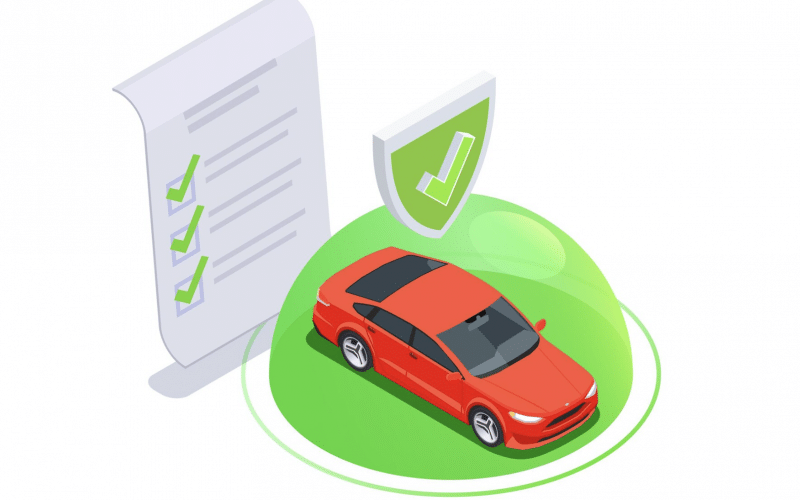Commercial auto insurance providers deliver a form of car insurance that protects vehicles used for business purposes. If you frequently use your personal vehicle for business or if your business owns one or more commercial vehicles, then you should have commercial auto insurance.
A growing fleet of vehicles and escalating prices have contributed to the commercial auto insurance industry’s growth in recent years. According to IBISWorld, the industry experienced a 5.9% annual growth from 2014 to 2019, bringing the industry’s total revenue to $46 billion.
Also, according to the latest National Association of Insurance Commissioners (NAIC) report, the commercial auto insurance industry saw a total of $40.5 billion in direct written premiums in 2018. The largest 10 insurance groups comprised 42.6% of the total US market.
With auto insurance being one of the most common types of insurance, these huge numbers are not surprising.
What is commercial auto insurance?
Commercial auto insurance is a type of car insurance specifically designed for vehicles used for business purposes. It is a contract between you and your insurance company that outlines how your insurance company compensates you for financial losses if a business vehicle is involved in an accident or other problem covered by your policy.
Business vehicles can include company cars and commercial trucks and vans. Box trucks and food trucks are other examples of vehicles that can be covered by commercial auto insurance. Your personal car insurance won’t pay a claim if you’re driving a car for business and get into an accident.
A commercial auto insurance policy typically includes:
- Liability coverage, including bodily injury and property damage liability, to pay for injuries, deaths or property damage if a driver causes an accident while working. This coverage may also pay legal fees.
- Medical payments, no-fault or personal injury protection, to pay for the medical expenses of the driver and any passengers in an accident, regardless of fault.
- Uninsured motorist coverage to pay for injuries and sometimes property damage caused by an uninsured or hit-and-run driver. This coverage may also include underinsured motorist coverage if the at-fault driver doesn’t have enough car insurance coverage to cover all expenses.
- Comprehensive and collision coverage to pay for vehicle damage from theft, vandalism, flood, fire and damage if a work vehicle is hit by an object or another car.
Commercial policies could include other coverage, like towing and labor, rental reimbursement and lease gap coverage. However, they generally don’t cover tools or other items you’re carrying in the vehicle. A business owner’s policy — which contains commercial property insurance protections — can cover tools owned by the company, while a home or renters insurance policy covers personal belongings in the vehicle.
Top commercial auto insurance providers
Proper auto insurance coverage is imperative for businesses that own vehicles or even send employees out on errands in their own vehicles, as it helps to protect the company against liability and loss following an accident, theft, or other incidents. While personal auto insurance can protect certain business pursuits (such as real estate agents and rideshare drivers), this coverage can be limited and may not fully protect you and your business every time you or your employee get behind the wheel.
Below are the best commercial auto insurance providers to protect your business vehicles:
Progressive
Progressive is the best small business insurance provider for commercial auto policies because it covers almost every type of commercial vehicle. Additionally, policyholders benefit from an unlimited travel radius (in most states) and may adjust coverage as needed at any time, free of charge.
This company stands out for its commercial vehicle insurance, which is available for commercial trucks, business cars, emergency vehicles, military vehicles, and a variety of SUVs, vans, trucks, buses, tractors and trailers. This policy generally covers liability, physical damages, medical payments, uninsured motorists, hired auto and non-owned coverage.
Progressive also offers business owner’s policies (BOP), general liability coverage, professional liability coverage, workers’ compensation, health insurance, and cyber insurance.
Pros
- Second-largest business auto insurer in the U.S.
- Discount for bundling multiple business insurance policies
- Policies cover a wide variety of risks and vehicle types
Cons
- No online support via live chat
- Discounts are not available in all states
Nationwide Insurance
Nationwide commercial auto insurance has the best value in coverage, with a wide range of affordable policy options, valuable features, and deductibles as low as $0. Commercial auto insurance through Nationwide is available on a variety of business vehicles including cars, cargo vans, work vans, box trucks, pickup trucks, and utility trucks; however, semi-trucks and tractor-trailers are not covered.
You can get quotes online or over the phone, but you’ll need to work with an agent in order to actually buy a policy, based on our research.
Nationwide Insurance boasts exceptional customer satisfaction with zero complaints filed with state departments of DOI. It has developed an extensive suite of policies for the service industry, including a package of management liability policies, which are available as primary or excess through Nationwide’s specialty line.
Pros
- Highly-ranked in customer satisfaction
- Wide range of coverage and deductible options
- Submit claims online
Cons
- Need to work with an agent
- No coverage for semis or tractor-trailers
- Not available in all states
Farmers
If you are looking for commercial auto insurance for a single company vehicle, Farmers is worth consideration. This carrier provides policies to a large number of industries, with coverage that even extends to employees’ own vehicles (when driving for business purposes). It provides commercial auto protection in the form of liability, underinsured/uninsured motorist, comprehensive, and many other coverages.
Farmers offers coverage for specialized industries and losses, too. For instance, it can cover tools that are stolen from a contractor’s vehicle, as well as coverage for food spoilage or food-borne illness when insuring a food truck. This type of protection is often offered through separate BOP policies with some other carriers.
The company doesn’t offer online quotes, and you will need to work with a local agent in order to price out and buy a policy. Discounts are somewhat limited but include discounts for bundling, vehicle safety technology, and corporations. Claims can be submitted over the phone or online.
The highly rated Farmers mobile app also gives policy owners access to their coverage anytime, from anywhere.
Pros
- Highly specialized coverage options
- Many industries covered
- Top-rated mobile app
Cons
- No online quotes
- Need to work with agent
- Limited discounts
The Hartford
Thanks to its financial strength, customer satisfaction, and available policies, The Hartford is one of the top commercial auto insurance providers. This carrier provides resources to businesses with fleet vehicles to not only offer solid coverage but also help employees avoid accidents and reduce risk.
The Hartford offers a number of coverages that can help you handle vehicle downtime such as towing, rental reimbursement, and downtime loss coverages. It offers hired and non-owned auto coverage that is useful to many businesses. The company also makes it easy to snag additional savings on your commercial fleet policy by offering discounts for multiple vehicles, paying in full, or being a safe driver.
Coverage options include liability, comprehensive, collision, uninsured/underinsured motorist, medical payments, and non-owner. It also has a FleetAhead program for business fleets, which uses wireless devices on vehicles to promote safety, manage incidents, and qualify for additional savings. Commercial auto insurance coverage through The Hartford also offers the option of “drive other car” protection, for when employees and owners conduct business in personal, borrowed, rented, or leased vehicles.
Claims can be made 24 hours a day, seven days a week, either online or over the phone. However, it offers no online quotes, so you will need to call for information and pricing in your specific area.
Pros
- Coverages offered to help handle vehicle downtime
- Specialized services and features for fleets
Cons
- No online quotes
State Farm
With top customer satisfaction ratings, State Farm is the best pick for the best customer service in commercial auto insurance. It has consistently ranked within the top three insurers for customer satisfaction over the last three years.
Commercial insurance options include liability (bodily injury and personal property), medical payments, underinsured motorist, uninsured motorist, comprehensive, and collision coverage. The company does offer additional coverage features such as Employer Non-Owned car Liability (ENOL), which extends policy coverage to employees’ own vehicles when driven for business purposes. It also offers rideshare coverage options on personal auto insurance policies, saving many drivers from paying the higher premiums of a commercial policy.
State Farm does not offer online quotes, so you’ll need to work with an agent to get a quote and purchase coverage. However, you can file claims online, over the phone, or through the award-winning mobile app.
Pros
- Top customer satisfaction ratings
- Top financial strength ratings
Cons
- Online quotes not offered
- Need to work with agent
- Limited policy options
How does commercial auto insurance work?
A commercial auto insurance policy works like a personal car insurance policy, except it covers your work vehicles such as delivery vans, trucks and company cars. It pays for injuries and property damage to others if you or an employee cause an accident while driving your work vehicle.
Commercial auto insurance also pays to repair or replace your work vehicle if you buy additional coverage types such as collision and comprehensive insurance.
How to pick the best commercial auto insurance providers
Policy & coverage options
When purchasing commercial auto insurance for your business, it is crucial to consider the coverage options offered by the providers. While most insurance companies can provide general coverage for business operations, not all policies will meet your specific needs. Therefore, it is essential to comprehend the limits of each policy and identify the one that is most suitable for your business.
Fortunately, several strategies exist for evaluating the coverage options of a carrier without going through the tedious process of obtaining a detailed quote.
Customer satisfaction & claims support
In addition to the company’s ability to provide coverage tailored to your specific requirements, customer satisfaction should be a top priority. Customer satisfaction ratings demonstrate how customers perceive their interaction with their insurer across different aspects of their experience. At the very least, your insurance provider should have a user-friendly website for managing your policy and filing claims, as well as knowledgeable and responsive customer service representatives available over the phone.
It is crucial to consider the manner in which the company communicates with you and how they engage with you throughout your association with them.
Pricing & quotes
Pricing can be difficult to evaluate when comparing commercial auto insurance providers. Most of the time, insurers won’t (or simply can’t) provide enough insight into pricing until they get information from you. This means that customers usually need to obtain a quote before they can be certain of what they will pay.
In many cases, though, getting a quote can be a time-consuming process that requires a great deal of disclosure and documentation.
Financial strength
When assessing insurance providers, the financial strength of the underwriting company carries significant weight. It is difficult to fathom a scenario where your insurer is unable to fulfill its obligations to you in the event of a covered loss, but this can happen.
Furthermore, a company’s financial stability reflects more than just its potential; it also reveals its track record.
What does commercial auto insurance cover?
- Property damage liability coverage: Provides you with protection if your vehicle accidentally damages another person’s property and in most cases provides you with a legal defense.
- Bodily injury liability coverage: Pays for bodily injury or death resulting from an accident for which you are at fault and in most cases provides you with a legal defense.
- Collision coverage: Pays for damage to your vehicle when it hits or is hit by another object.
- Comprehensive physical damage coverage: Pays for damage to your vehicle from theft, vandalism, flood, fire, and other covered perils.
- Medical payments, no-fault or personal injury coverage: Usually pays for the medical expenses of the driver and passengers in your vehicle incurred as a result of a covered accident regardless of fault.
- Combined single limit (CSL): Liability policies typically offer separate limits that apply to bodily injury claims for property damage. A combined single limits policy has the same dollar amount of coverage per covered occurrence whether bodily injury or property damage, one person or several.
- Uninsured motorist coverage: Pays for your injuries and, in some circumstances, certain property damage caused by an uninsured or a hit-and-run driver. In some cases, underinsured motorist coverage is also included. This is for cases in which the at-fault driver has insufficient insurance.
Why do you need commercial auto insurance?
Not having commercial auto insurance puts you at risk of having to pay for damage and injuries involving your company vehicles.
Without the coverage, you may wind up paying medical bills and legal fees if you or an employee are injured in an accident involving a business vehicle. You will also have to pay for damages, injuries and potential lawsuits for people in other vehicles and property owners.
Commercial vehicle insurance providers additionally offer collision and comprehensive coverage. This helps pay to repair or replace your work vehicle for problems such as car accidents, theft, vandalism, floods, fires, severe weather and collisions with animals.
Recommended Articles
- Commercial Auto Insurance: How Does It Work?
- CAR INSURANCE WITHOUT A CAR: How Does It Work?
- 10 Best Commercial Insurance Companies 2023






